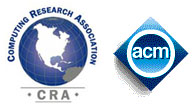CRA, USACM Urge Support for NIST Labs
In response to the dire funding situation for the National Institute of Standards and Technology (NIST) Labs program in FY 2004 and beyond, CRA and US ACM’s Public Policy Committee have joined in a letter to leaders in Congress calling for increased support in the FY 2005 appropriations process.
Among the labs most likely impacted by the cuts — cuts enacted as part of the FY 2004 Omnibus Appropriations bill passed in January — is NIST’s Computer Security Division, which has played a historic role in computer security by conducting security research on emerging technologies, promoting security assessment techniques, providing security management and guidance, and facilitating a greater awareness of the need for security.
The extended entry below has the full letter, or you can download a PDF version here (335k).
March 31, 2004
The Honorable J. Dennis Hastert
Speaker of the House
U.S. House of Representatives
Washington, DC 20510
Dear Mr. Speaker:
As representatives of two leading computing societies together representing more than 200 computing research institutions and over 85,000 computing professionals, we write to express our great concern with the current funding level for the National Institute of Standards and Technology (NIST) Laboratory Program, and to urge you to support efforts to fund the program at the President’s requested level of $422 million for FY 2005.
The NIST Labs have played an important role in the progress of computing research – research that has, in turn, enabled the new economy. Advances in information technology have led to significant improvements in product design, development and distribution for American industry, provided instant communications for people worldwide, and enabled new scientific disciplines like bioinformatics and nanotechnology that show great promise in improving a whole range of health and communications technologies.
Within NIST’s Labs, the Computer Security Division (CSD) has played a historic role in computer security by conducting security research on emerging technologies, promoting security assessment techniques, providing security management guidance, and facilitating a greater awareness of the need for security. In particular, the CSD has demonstrated NIST’s ability to blend science and technology with commerce by working in partnership with industry and the cryptographic community to develop an Advanced Encryption Standard (AES). The CSD’s work on AES and its numerous other contributions have been good for the U.S. government, information technology industry, research enterprise, and the overall security of the Internet.
Current work underway at the NIST Labs will have important impact in cybersecurity and voting technologies, semiconductor manufacturing, and nanotechnology research that could help unlock future advancements in computing. Unfortunately, this work and the successful efforts to recruit a core of talented researchers are in jeopardy as a result of funding levels enacted as part of the FY 2004 appropriations process. The President’s request of $422 million for FY 2005 represents the minimum increase required – only enough to cover the cuts Congress imposed last year. To avoid jeopardizing NIST’s ability to produce materials trusted by the community, impairing its ability to conduct research, and detracting from some of its vital standards-orientated work, we urge you to make this funding a priority for FY 2005.
The Computing Research Association (CRA) and the U.S. Public Policy Committee of the Association for Computing Machinery (USACM) stand ready to assist you address this important issue. We appreciate your continued support for research and development funding and would be happy to answer any questions you or your staff might have.
Sincerely,
James D. Foley, PhD
Chair, CRA
Barbara Simons, PhD
Eugene H. Spafford, PhD
Co-Chairs, US ACM Public Policy Committee (USACM)
Association for Computing Machinery









